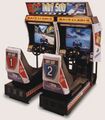Difference between revisions of "Indy 500"
From Sega Retro
m (Text replacement - "{{ScanArcade" to "{{ScanArcade | type=upright") |
|||
| Line 79: | Line 79: | ||
}} | }} | ||
{{ScanArcade | {{ScanArcade | ||
| + | | type=upright | ||
| console=Model 2 | | console=Model 2 | ||
| region=US (deluxe) | | region=US (deluxe) | ||
}}{{ScanArcade | }}{{ScanArcade | ||
| + | | type=upright | ||
| console=Model 2 | | console=Model 2 | ||
| region=US (twin) | | region=US (twin) | ||
| manual=Indy500 Model2 Manual.pdf | | manual=Indy500 Model2 Manual.pdf | ||
}}{{ScanArcade | }}{{ScanArcade | ||
| + | | type=upright | ||
| console=Model 2 | | console=Model 2 | ||
| region=JP (deluxe) | | region=JP (deluxe) | ||
}}{{ScanArcade | }}{{ScanArcade | ||
| + | | type=upright | ||
| console=Model 2 | | console=Model 2 | ||
| region=JP (twin) | | region=JP (twin) | ||
Revision as of 14:45, 16 November 2015
| Indy 500 | |||||
|---|---|---|---|---|---|
| System(s): Sega Model 2B CRX | |||||
| Publisher: Sega | |||||
| Developer: Sega AM1 | |||||
|
This short article is in need of work. You can help Sega Retro by adding to it.
Indy 500 is a racing game developed by Sega AM1 and published by Sega in arcades for the Sega Model 2B CRX arcade platform in 1995. It is based upon the annual Indianapolis 500 race held in Indiana, US, and in some respects is seens an evolution of the earlier Virtua Racing.
Reportedly a Sega Saturn version of Indy 500 was once planned. It is not thought to have progressed very far before being scrapped.
Contents
Gameplay
Like other Sega arcade racers, Indy 500 offers no choice of cars and only three tracks. Players can choose either automatic or manual transmission and switch between three different camera viewpoints while driving. The game is notable for simulating real world racing mechanics like drafting and tire wear. As the tires on the car wear down, the vehicle's grip decreases and it becomes more prone to sliding out of control. This can be remedied by driving through the pit lane on each track.
Tracks
History
Development
Indy 500's history is an odd one, having once been tipped for release on Sega Model 3 hardware, before being downgraded to the Model 2 platform after a series of delays with the hardware. As a product it is not too dissimilar to the earlier Daytona USA with similar rules and features (and has a real-world track license), although unlike Daytona USA, Indy 500 never saw the same levels of success.
Many Virtua Formula cabinets (i.e. enhanced versions of Virtua Racing) were converted into linked eight-player Indy 500 ones. These deluxe, full-motion simulators required an operator to run and were found at Sega World, Joypolis, and GameWorks venues.
Legacy
Indy 500 in its original form has never been ported to a home console, although was available in the form of a vastly simplified LCD game and for the Tiger R-Zone. The Game.com game Indy 500 is also said to be a loose interpretation of the arcade release - the situation is currently unclear, as despite sharing artwork, Sega did not lend their name to the product in any way.
Sega's Indy 500 should not be confused with the 1977 Atari 2600 Indy 500, or the 1997 PlayStation Indy 500 developed by Tomy.
Production Credits
Planning: T. Seki
Design: A.Watanabe, M.Kondo, S.Nakajima, K.Baba, K.Matsui, T.Kudo
Programming: T.Yokoyama, I.Kawaoka, A.Vass, T.Yasuda, Y.Ohta
Sound Design: T.Kawamura
Music: T.Kawamura, D.Leytze
Voice Talent: L.Jeffryes
Special thanks to: D.Leytze, Y.Isoda, AM3 & AM4, AM-Hardware
Produced by: Sega
Gallery
Promotional Material
Physical Scans
| Sega Retro Average | ||||
|---|---|---|---|---|
|
| N/A | |
|---|---|
| Based on 0 reviews | |
| Model 2, US (deluxe) | ||||
|---|---|---|---|---|
| Model 2, JP (deluxe) | ||||
|---|---|---|---|---|
| Model 2, JP (twin) | ||||
|---|---|---|---|---|







